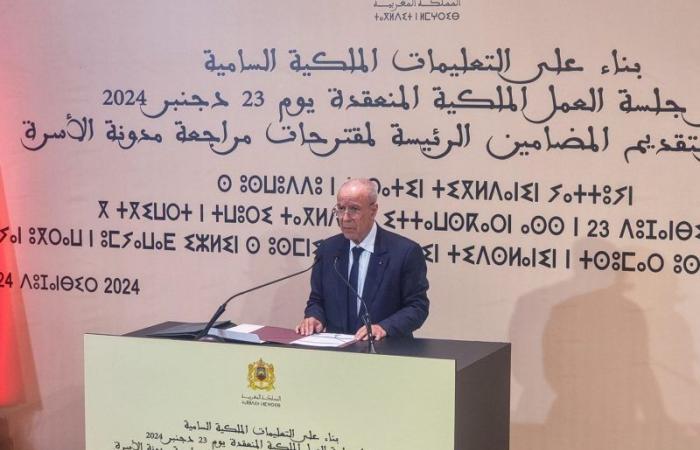JavaScript is disabled! Why you want to do so? Please enable JavaScript in your web browser!
Highly anticipated, the new Moudawana is already sparking debates while only the broad outlines of the approved proposals were revealed to the public on December 24, 2024. The rest of the process provides for the development of a preliminary draft by the government. This will have to be adopted by the Government Council and then voted on by both Chambers of Parliament.
Concretely, what is likely to change? The details of the proposals from the body responsible for developing the Moudawana remain to be discovered. Moreover, the Minister of Justice, Abdellatif Ouahbi, member of this body, indicated that it proposed 139 dispositions revised, the aim of which is to respond to developments in society.
While waiting to learn more, let’s dissect the main proposals revealed by Abdellatif Ouahbi and which relate to marriage, divorce and inheritance.
>> The wedding:
→ Concerning the marriage aspect, it is proposed to authorize marriage to Moroccans aged 18 years and over. Exceptionally, those aged 17 may also be authorized. For the moment, the conditions governing this exception have not yet been revealed.
→ Even if themarriage certificate is considered the only proof of marriage, it is proposed to make it possible to authenticate the engagement (توثيق الخطوبة) and to authorize matrimonial action in certain exceptional cases. These are also to be determined.
→ People in a situation of handicap are also protected, since the guarantees regarding their marriage will be strengthened.
→ Concerning the Moroccans living abroadit is proposed to allow them to marry in the absence of Muslim witnesses, which was not the case previously.
→ The polygamy, always authorized, will see its access further locked. When a man and a woman are about to get married, the woman will be asked about her position on polygamy. If she denies her future husband the right to polygamy, he will not be allowed to marry a second wife.
And even if the woman does not deny him this right, he will only be able to take a second wife when the first is:
- sterile;
- or suffering from an illness preventing their sexual relations;
- or if the judge considers that an objective and exceptional reason justifies the right to polygamy.
These objective and exceptional reasons have not yet been specified. The same goes for the second and third wives. Will they have the right to refuse, when contracting the marriage certificate, that the husband marries a third or fourth wife?
>> Divorce:
→ Before starting legal proceedings, it is proposed that spouses wishing to divorce go through a new non-judicial mediation and reconciliation body. The role of this body will be limited to trying to reconcile the spouses. It will not be competent in the event of an amicable divorce.
→ About divorce amiable, it is proposed to subject it to contractual freedom between the spouses. In other words, they will not need to go through legal proceedings.
→ Generally speaking, divorce types have been revised. According to Abdellatif Ouahbi, divorce by chiqaq covers everything. In the event of a legal divorce, the courts have a maximum period of six months to decide the matter between the spouses. Currently, some cases drag on for several years. Which costs a lot of time and money for the parties.
→ Speaking of money, it is proposed to review the management of acquired heritage during the matrimonial relationship so as to consider the work carried out by the housewife as a participation in the development of the assets acquired during the marriage period.
In other words, if the woman does not work during all or part of the period of marriage and, during this time, the couple has acquired new property, these will be shared between the spouses at the time of divorce.
For the moment, the criteria according to which this division will take place have not yet been revealed. But the objective of this proposal is to protect women, sometimes forced to devote themselves to household chores, who, at the time of divorce, find themselves without any material goods despite their sacrifices and dedication to the family home.
Many women’s rights activists believe that if spouses were able to develop their assets during the period of marriage, it is also thanks to the role played by their wives in managing the household.
-In any case, this proposal does not concern property acquired before marriage.
→ Another change for the divorced woman: the possibility of maintaining custody of your children even after remarriage.
Currently, the father does not lose any of his rights over the child when he remarries. Which is not the case for the mother. A situation deemed unfair and discriminatory, which the body responsible for developing the Moudawana proposes to repair through this proposal.
→ It is even suggested to consider that custody of the child is a right common to the parents during the marriage, with the possibility of extending it in the event of agreement after the divorce. The same goes for the right of guardianship.
In the event of disagreement between the parents, recourse to the family judge will be possible.
→ It is also proposed to put in place benchmark indicators to set the amount of the alimony which, let us remember, is due to the child and not to the ex-wife.
>> The inheritance
→ When death separates them, the husband or wife still alive will be able to keep the family home until his death, in compliance with certain conditions not yet revealed.
→ Concerning the inheritance of daughters who risk losing all or part of the inheritance due to the rule of prejudice their protection can be guaranteed through donation on the part of the parent, to be done during his or her lifetime.
→ According to Abdellatif Ouahbi, the novelty is that the donation will no longer be linked to possession. The latter being a condition currently required for the validity of the donation. Today, the donation only takes place if there is actual possession of the property by the donee.
However, when the father, for example, makes a donation to his minor daughters and dies without his daughters having taken possession of the property, the validity of this donation is sometimes called into question by the other heirs. Which led to its cancellation.
Ouahbi assures that possession will no longer be linked to donation.
→ And between spouses of different faithsit is proposed to open the possibility to testament and to the donation.
These proposals constitute the fruit of work initiated by King Mohammed VI during his Speech from the Throne in July 2022, followed, in September 2023, by the creation, by royal order, of the body responsible for piloting the reform of the Moudawana.
This body held 130 hearing sessions with civil society, political parties and other women’s rights activists, before presenting its proposals to the head of government who in turn submitted them to the King.
The Sovereign subsequently referred the matter to the Superior Council of Ulemas, before the broad outlines of this reform were publicly presented.
Do you have a real estate project in mind? Yakeey & Médias24 help you make it happen!
© Media24. Any reproduction prohibited, in any form whatsoever, without written authorization from the Société des Nouveaux Médias. This content is protected by law and in particular law 88-13 relating to the press and publishing as well as laws 66.19 and 2-00 relating to copyright and related rights.






